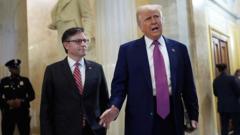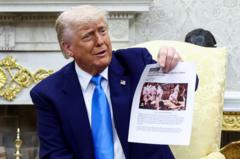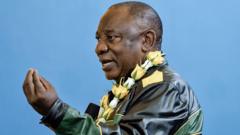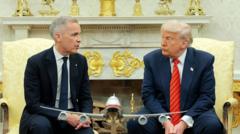Rob Hoatson, who organized the memorial, emphasizes the misunderstanding in light of sensitive racial tensions.
**Trump's Misinterpretation of South African Crosses Sparks Controversy**
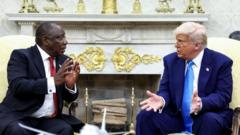
**Trump's Misinterpretation of South African Crosses Sparks Controversy**
A farmer clarifies that white crosses displayed in South Africa were not burial sites as claimed by Donald Trump.
In a recent encounter between U.S. President Donald Trump and South African President Cyril Ramaphosa, a display of white crosses in KwaZulu-Natal province was at the center of a contentious discussion. Hoatson, the farmer responsible for the crosses, was compelled to clarify that they are not burial sites but a temporary memorial for his murdered neighbors, Glen and Vida Rafferty.
During the Oval Office meeting, Trump showcased a video of the crosses to argue that white farmers in South Africa face systematic violence. In his remarks, he referred to the crosses as burial sites where families mourned their lost relatives. "These are burial sites… over 1,000 of white farmers and… those cars aren't driving, they're stopped there to pay respects to their family member who was killed," claimed Trump.
In response, Hoatson stated that while he was okay with Trump using the footage, he felt the president exaggerated the facts. The crosses, amounting to over 2,500, were erected along the roadway in honor of the Raffertys, who were killed on their farm in 2020. They were subsequently removed, drawing various interpretations and reactions from different stakeholders.
While Trump emphasized the tragic loss of white farmers, Ramaphosa pushed back against the implication of a targeted campaign against Afrikaners. He acknowledged crime in South Africa but pointed out that violence afflicts all racial groups, stating that the majority of murder victims are black. He stated, "criminality in our country... people who do get killed through criminal activity are not only white people."
The discussions have reignited a debate regarding racial tensions in South Africa, with some Afrikaner activists welcoming Trump's stance as a spotlight on their plight, while others criticized the narrative for being one-sided and exaggerated.
Political analyst Pieter du Toit condemned the portrayal of South Africa as inherently racist, attributing it to misleading information reaching American conservatives over time. The confrontation has raised questions about the complex dynamics of race, crime, and discourse between the U.S. and South Africa, illustrating that while tragedies are real, narratives around them can often be inflated for political leverage.
As this dialogue continues, South Africans grapple with the realities of crime and systemic issues, seeking a balanced representation of their societal struggles in an increasingly polarized global narrative.
During the Oval Office meeting, Trump showcased a video of the crosses to argue that white farmers in South Africa face systematic violence. In his remarks, he referred to the crosses as burial sites where families mourned their lost relatives. "These are burial sites… over 1,000 of white farmers and… those cars aren't driving, they're stopped there to pay respects to their family member who was killed," claimed Trump.
In response, Hoatson stated that while he was okay with Trump using the footage, he felt the president exaggerated the facts. The crosses, amounting to over 2,500, were erected along the roadway in honor of the Raffertys, who were killed on their farm in 2020. They were subsequently removed, drawing various interpretations and reactions from different stakeholders.
While Trump emphasized the tragic loss of white farmers, Ramaphosa pushed back against the implication of a targeted campaign against Afrikaners. He acknowledged crime in South Africa but pointed out that violence afflicts all racial groups, stating that the majority of murder victims are black. He stated, "criminality in our country... people who do get killed through criminal activity are not only white people."
The discussions have reignited a debate regarding racial tensions in South Africa, with some Afrikaner activists welcoming Trump's stance as a spotlight on their plight, while others criticized the narrative for being one-sided and exaggerated.
Political analyst Pieter du Toit condemned the portrayal of South Africa as inherently racist, attributing it to misleading information reaching American conservatives over time. The confrontation has raised questions about the complex dynamics of race, crime, and discourse between the U.S. and South Africa, illustrating that while tragedies are real, narratives around them can often be inflated for political leverage.
As this dialogue continues, South Africans grapple with the realities of crime and systemic issues, seeking a balanced representation of their societal struggles in an increasingly polarized global narrative.




